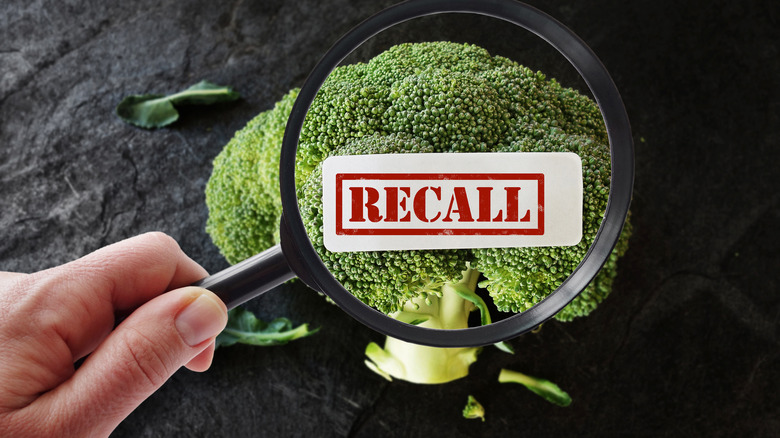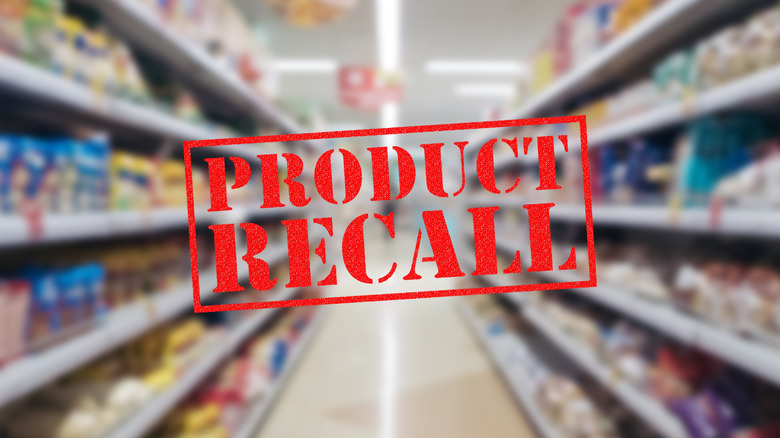Here's What An FDA Class I Recall Really Means
We all know that there are many food safety mistakes that can be downright dangerous, but we're all also familiar with the fact that sometimes, food safety is compromised long before we even buy the product. The U.S. Food and Drug Administration is one of the governing bodies responsible for keeping consumers safe, and it issues product recalls for a variety of reasons, from the presence of contaminants like lead or pathogens like listeria and salmonella. Not all recalls come with a classification code, but when the FDA announces that it's issuing a Class I recall, it's a huge deal.
The organization's official definition of a Class I recall is "a situation in which there is a reasonable probability that the use of or exposure to a violative product will cause serious adverse health consequences or death." That got your attention, didn't it? It absolutely should, and here's some more perspective.
In April of 2024, the U.S. PIRG Education Fund released a report summarizing U.S. Department of Agriculture (USDA) food recalls of the previous year. It found that recalls were at the highest they'd been since before the Covid-19 pandemic, and a single salmonella-associated recall had caused hundreds of illnesses and six recorded deaths. The USDA notably uses the same class system as the FDA. With that in mind, let's look at all the recall classes and what they mean for your safety.
Voluntary recalls can escalate into Class I recalls
For an example of just how food recalls can escalate, let's take a look at a certain case. In May 2024, the Palmer Candy Company issued a recall of several of its products, including its frosted pretzels, white fudge mini cookies, and yogurt pretzels. The FDA shared the recall, specified that there was a concern over salmonella, and that there were no illnesses immediately reported. The initial recall was expanded to cover more products on May 17, and on August 6, the recall was changed to a Class I, indicating a much higher risk than previously thought.
By comparison, a Class II recall is issued when there's a likelihood of a product causing temporary or minor health issues. A Class III, meanwhile, indicates that there's unlikely to be any health consequences at all, or that production of the product violates FDA laws in a way that isn't dangerous to human health.
It's worth noting that this system doesn't just apply to foods. The FDA also issues these warnings with the same definitions to other products, including medical devices. In 2022, it was widely reported that the number of Class I recalls issued for medical devices had reached a 15-year high, and covered more than 61 million product units (via Industry Drive).
Class I recalls can be issued for a variety of reasons
While pathogens that cause food poisoning might be the first thing that comes to mind when you hear about food recalls, that's not the only reason they can happen. Many times, the reason for a Class I recall can be undeclared allergens. In May 2024, for example, there were a series of Class I recalls that involved the mislabeling of products that contained eggs, wheat, milk, soy, coconut, and peanuts, most of which are among the major food allergens that the FDA monitors.
Not labeling or incorrectly labeling foods containing these allergens can be a huge deal, and grocery chains like Aldi have gotten customer complaints about a lack of clarity in its labels. It's easy to see that accuracy is vital, as allergic reactions can range from mild swelling to anaphylactic shock and respiratory failure. There have also been instances of baby food and formula being recalled for nutritional labelling not consistent with what's actually in the product.
In many cases, a Class I recall can entitle customers who purchased a product to a refund, and the products themselves are sometimes temporarily discontinued. So how do you find out about recalls? Class I recalls are usually reported in mainstream media, are posted on the FDA's website, and consumers can also subscribe to FDA newsletters to find out about recent recalls.


